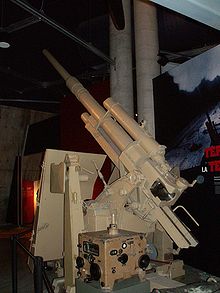
A fire-control system is a number of components working together, usually a gun data computer, a director, and radar, which is designed to assist a weapon system in hitting its target. It performs the same task as a human gunner firing a weapon, but attempts to do so faster and more accurately.
An early use of fire-control systems was in bomber aircraft, with the use of computing bombsights that accepted altitude and airspeed information to predict and display the impact point of a bomb released at that time. The best known United States device was the Norden bombsight.
Simple systems, known as lead computing sights also made their appearance inside aircraft late in the war as gyro gunsights. These devices used a gyroscope to measure turn rates, and moved the gunsight's aim-point to take this into account, with the aim point presented through a reflector sight. The only manual "input" to the sight was the target distance, which was typically handled by dialing in the size of the target's wing span at some known range. Small radar units were added in the post-war period to automate even this input, but it was some time before they were fast enough to make the pilots completely happy with them.